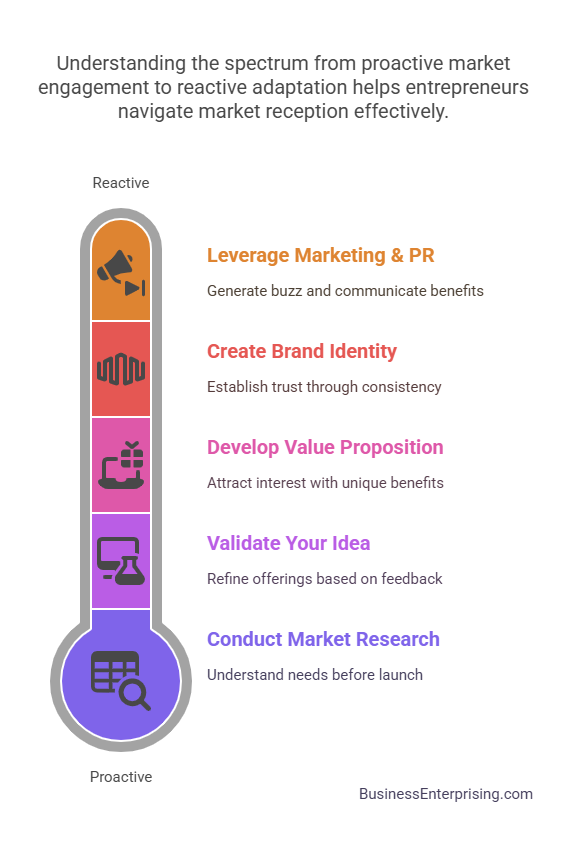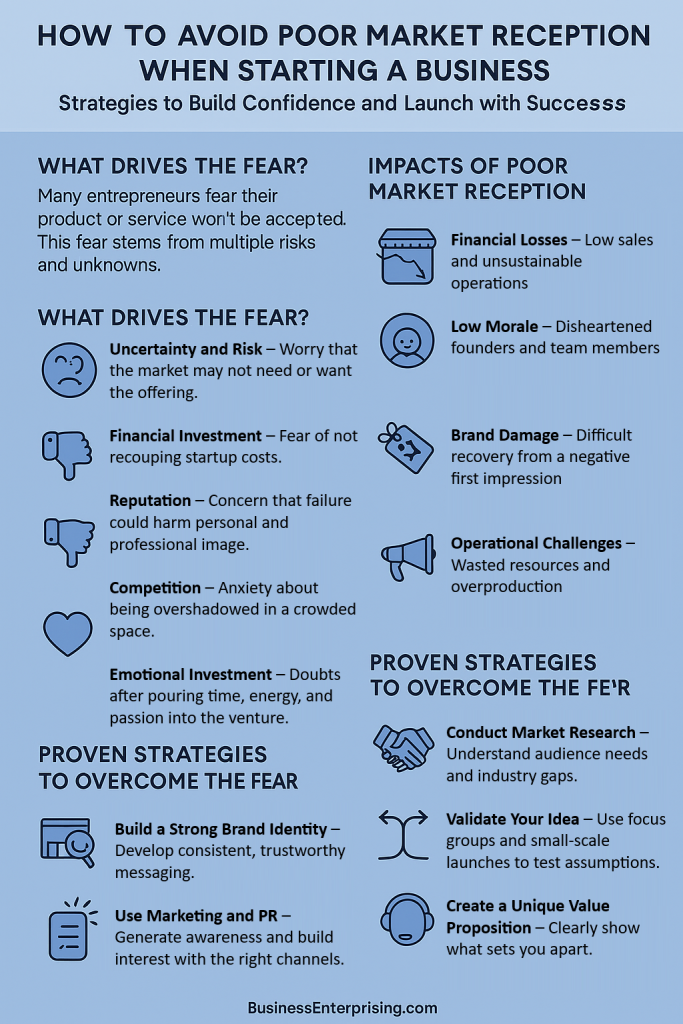Starting a business is an exhilarating journey filled with hopes, dreams, and a fair share of fears. Among the most significant goals for entrepreneurs are avoiding a poor market reception. The fear of your target audience not wanting your product or service can be paralyzing, preventing innovative ideas from coming to life. However, understanding the dynamics of market reception and employing strategic approaches can help mitigate these fears and pave the way for a successful business launch.
Understanding the Market
The fear of poor market reception often arises from several interconnected concerns that weigh heavily on entrepreneurs.
Uncertainty and Risk: First and foremost, launching a new product or service always involves a degree of uncertainty. Entrepreneurs may worry that their offerings will not meet market needs or preferences. As a result, this unpredictability can create hesitation and doubt.
Financial Investment: Additionally, starting a business requires a substantial financial commitment. Therefore, the fear of not recovering that investment due to a lack of demand becomes a serious concern for many.
Reputation: Moreover, entrepreneurs often fear that a poor market reception could damage their reputation—both personally and professionally. This fear can also affect their confidence in future ventures or investment opportunities.
Competition: In addition, competitive markets amplify this fear. Entrepreneurs may feel overwhelmed by the presence of well-established players. Consequently, the idea of failing to stand out can seem especially daunting.
Emotional Investment: Lastly, entrepreneurs devote significant time, passion, and energy into their businesses. When the market does not respond positively, it can feel like a personal rejection. This emotional toll, combined with other factors, often discourages continued progress.
Implications of Poor Market Reception
Receiving a poor market reception can have several adverse effects on a new business:
Financial Losses: Inadequate sales can lead to financial losses, making it difficult to sustain operations and meet financial obligations.
Low Morale: Poor market reception can also impact the morale of the entrepreneur and their team, leading to decreased motivation and productivity.
Brand Damage: A negative market reception can harm the brand’s image, making it challenging to re-enter the market with new offerings.
Operational Challenges: Low demand can lead to excess inventory, wasted resources, and operational inefficiencies.
Strategies for Mitigating the Fear of Poor Market Reception
Despite the inherent risks, there are several strategies entrepreneurs can employ to mitigate the fear of poor market reception and increase their chances of success:
Conduct Thorough Market Research: Understanding the market landscape is crucial. Conduct comprehensive market research to identify target audiences, understand their needs and preferences, and assess the competitive environment. This insight can help tailor offerings to meet market demands effectively.
Validate Your Idea: Before fully launching your product or service, validate your idea through pilot programs, focus groups, or limited releases. Also collect feedback and make necessary adjustments. This iterative approach helps refine the offering and reduces the risk of poor reception.
Develop a Unique Value Proposition: Clearly articulate what sets your product or service apart from competitors. A compelling value proposition that addresses specific customer pain points can attract attention and interest, even in competitive markets.
Create a Strong Brand Identity: Invest in building a strong brand identity that resonates with your target audience. Consistent branding across all touchpoints helps establish trust and recognition, enhancing market reception.
Leverage Marketing and PR: Effective marketing and public relations efforts can significantly influence market reception. Use various channels to create awareness, generate buzz, and communicate the benefits of your offering. Engaging storytelling and a robust online presence can amplify your reach.
Know the Market
Build Relationships and Networks: Networking with industry influencers, potential customers, and other entrepreneurs can provide valuable insights and support. Building strong relationships can also lead to partnerships and collaborations that enhance market reception.
Monitor and Adapt: Continuously monitor market response and be prepared to adapt your strategy based on feedback and changing market conditions. Flexibility and responsiveness are key to navigating the initial phases of market entry.
Offer Exceptional Customer Service: Providing excellent customer service can turn early adopters into loyal advocates. Positive word-of-mouth and customer reviews can significantly enhance market reception.
Manage Expectations: Set realistic expectations for your launch. Understand that building a successful business takes time and patience. Managing expectations helps mitigate disappointment and allows for steady, sustainable growth.
Secure Adequate Funding: Ensure you have sufficient funding to weather initial challenges. Adequate financial resources provide the cushion needed to make necessary adjustments and sustain operations during the early stages.
Avoiding a poor market reception is a common and valid concern for entrepreneurs. However, by conducting thorough market research, validating ideas, developing a unique value proposition, and leveraging effective marketing strategies, entrepreneurs can mitigate this fear and increase their chances of success. Building a strong brand identity, offering exceptional customer service, and maintaining flexibility are crucial steps in navigating the challenges of market entry.
Starting a business is inherently risky, but with the right strategies and a proactive approach, entrepreneurs can turn their fears into opportunities for growth and innovation. Understanding and addressing the factors that influence market reception helps create a solid foundation for launching successful products and services. By embracing these strategies, entrepreneurs can confidently navigate the journey of starting a business and achieve long-term success in the marketplace.


